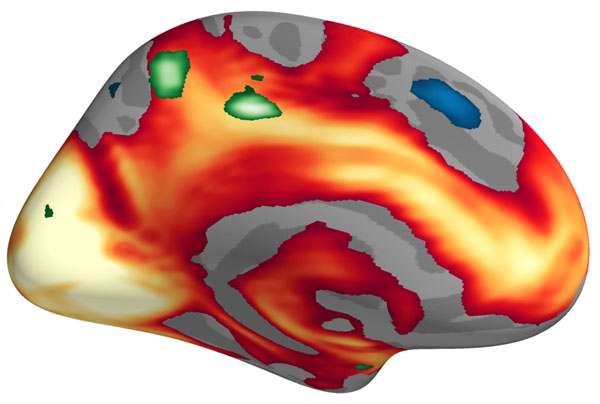Men and Women Process Emotions Differently

Brain activity: red and yellow indicates the more active areas of the brain when negative emotional images are rated as highly stimulating. Green indicates the areas that become more active in women MCN, University of Basel
It is known that women often consider emotional events to be more emotionally stimulating than men do. Earlier studies have shown that emotions influence our memory: the more emotional a situation is, the more likely we are to remember it. This raises the question as to whether women often outperform men in memory tests because of the way they process emotions. A research team from the University of Basel's “Molecular and Cognitive Neurosciences” Transfaculty Research Platform attempted to find out.
With the help of 3,398 test subjects from four sub-trials, the researchers were able to demonstrate that females rated emotional image content – especially negative content – as more emotionally stimulating than their male counterparts did. In the case of neutral images, however, there were no gender-related differences in emotional appraisal.
In a subsequent memory test, female participants could freely recall significantly more images than the male participants. Surprisingly though, women had a particular advantage over men when recalling positive images. “This would suggest that gender-dependent differences in emotional processing and memory are due to different mechanisms,” says study leader Dr Annette Milnik.
Increased brain activity
Using fMRI data from 696 test subjects, the researchers were also able to show that stronger appraisal of negative emotional image content by the female participants is linked to increased brain activity in motoric regions. “This result would support the common belief that women are more emotionally expressive than men,” explained Dr Klara Spalek, lead author of the study.
The findings also help to provide a better understanding of gender-specific differences in information processing. This knowledge is important, because many neuropsychiatric illnesses also exhibit gender-related differences. The study is part of a research project led by professors Dominique de Quervain and Andreas Papassotiropoulos at the University of Basel, which aims to increase the understanding of neuronal and molecular mechanisms of human memory and thereby facilitate the development of new treatments.
Original source
Klara Spalek, Matthias Fastenrath, Sandra Ackermann, Bianca Auschra, XDavid Coynel, Julia Frey, Leo Gschwind, Francina Hartmann, Nadine van der Maarel, Andreas Papassotiropoulos, Dominique de Quervain and Annette Milnik
Sex-Dependent Dissociation between Emotional Appraisal and Memory: A Large-Scale Behavioral and fMRI Study
Journal of Neuroscience (2014) | doi: 10.1523/jneurosci.2384-14.2015
Media Contact
More Information:
http://www.unibas.chAll latest news from the category: Studies and Analyses
innovations-report maintains a wealth of in-depth studies and analyses from a variety of subject areas including business and finance, medicine and pharmacology, ecology and the environment, energy, communications and media, transportation, work, family and leisure.
Newest articles

First-of-its-kind study uses remote sensing to monitor plastic debris in rivers and lakes
Remote sensing creates a cost-effective solution to monitoring plastic pollution. A first-of-its-kind study from researchers at the University of Minnesota Twin Cities shows how remote sensing can help monitor and…

Laser-based artificial neuron mimics nerve cell functions at lightning speed
With a processing speed a billion times faster than nature, chip-based laser neuron could help advance AI tasks such as pattern recognition and sequence prediction. Researchers have developed a laser-based…

Optimising the processing of plastic waste
Just one look in the yellow bin reveals a colourful jumble of different types of plastic. However, the purer and more uniform plastic waste is, the easier it is to…



